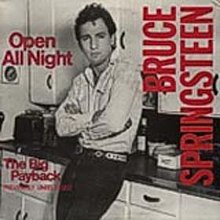
Darkness on the Edge of Town is the fourth studio album by the American singer-songwriter Bruce Springsteen, released on June 2, 1978, by Columbia Records. The album was recorded after a series of legal disputes between Springsteen and his former manager Mike Appel, during sessions in New York City with the E Street Band from June 1977 to March 1978. Springsteen and Jon Landau co-produced, with assistance from bandmate Steven Van Zandt.

The River is the fifth studio album by the American singer-songwriter Bruce Springsteen, released as a double album on October 17, 1980, by Columbia Records. The album was Springsteen's attempt at making a record that captured the E Street Band's live sound. Co-produced by Springsteen, his manager Jon Landau, and bandmate Steven Van Zandt, the recording sessions lasted 18 months in New York City from March 1979 to August 1980. Springsteen originally planned to release a single LP, The Ties That Bind, in late 1979, before deciding it did not fit his vision and scrapped it. Over 50 songs were recorded; outtakes saw release as B-sides and later on compilation albums.

"Atlantic City" is a song written and recorded by Bruce Springsteen, which first appeared on Springsteen's 1982 solo album Nebraska. Springsteen has often played the song in a full band arrangement in concert.
"Nebraska" is the title song of Bruce Springsteen's 1982 solo album. The stark, moody composition sets the tone for the LP, the content of which consists mostly of songs about criminals and desperate people, accompanied only by acoustic guitar and harmonica. The song has been covered by other artists, including Steve Earle, Chrissie Hynde, and Aoife O'Donovan.

"Tenth Avenue Freeze-Out" is a song by the American singer-songwriter Bruce Springsteen, from his 1975 album Born to Run.
"Growin' Up" is a song by American musician Bruce Springsteen from his 1973 album Greetings from Asbury Park, N.J..

The Bruce Springsteen with the Seeger Sessions Band Tour, afterward sometimes referred to simply as the Sessions Band Tour, was a 2006 concert tour featuring Bruce Springsteen and the Sessions Band playing what was billed as "An all-new evening of gospel, folk, and blues", otherwise seen as a form of big band folk music. The tour was an outgrowth of the approach taken on Springsteen's We Shall Overcome: The Seeger Sessions album, which featured folk music songs written or made popular by activist folk musician Pete Seeger, but taken to an even greater extent.
"Highway Patrolman" is a song written and recorded by Bruce Springsteen and was first released as the fifth track on his 1982 album Nebraska.
"Downbound Train" is a song that appears on the 1984 Bruce Springsteen album Born in the U.S.A. The song is a lament to a lost spouse, and takes on a melancholy tone. Author Christopher Sandford described the song as beginning "like a Keith Richards' riff" that ultimately moves to "one of those great country busted-heart lines, 'Now I work down at the car wash/where all it ever does is rain.'"
"Working on the Highway" is a 1984 song written and performed by Bruce Springsteen. It was released on the album Born in the U.S.A. and has remained a popular concert song for Springsteen and the E Street Band.
"Bobby Jean" is a song written and performed by Bruce Springsteen, from his 1984 album Born in the U.S.A. Although not released as a single, it reached number 36 on the Billboard Mainstream Rock Tracks chart.
"Darlington County" is a 1984 song written and performed by Bruce Springsteen. It was released on the album Born in the U.S.A. and has remained a popular concert song for Springsteen and the E Street Band.
"The Ties That Bind" is a song written and performed by Bruce Springsteen. It is the opening song on his fifth album, The River. It was the second song recorded for 'The River', at The Power Station in New York on April 9–11, 1979. The recording engineer was Bob Clearmountain. After Springsteen injured himself driving an ATV, forcing a one-month halt, Neil Dorfsman became the chief engineer when sessions resumed. Springsteen wrote the song during September - October 1978, while on the road during the Darkness Tour. After introducing it on November 1, 1978, it was played every night during the final two months of the tour.
"Ramrod" is a song written and performed by Bruce Springsteen for his fifth album, The River, released in 1980. It was recorded at The Power Station in New York on June 12, 1979. The song was written and originally recorded on September 12, 1977, for Springsteen's Darkness on the Edge of Town album, but that recording was not used for its release on The River.

"Fade Away" is a 1980 song written and performed by Bruce Springsteen, accompanied by the E Street Band. It is included on his album The River, and the second single released from it in the United States, reaching the top twenty in both the United States and Canada.
"Wreck on the Highway" is a song written and performed by Bruce Springsteen. It was originally released as the final track on his fifth album, The River. The version released on The River was recorded at The Power Station in New York in March–April 1980. As well as being the last track on The River, it was the last song recorded for the album.
"Johnny 99" is a song written and recorded by rock musician Bruce Springsteen, which first appeared on Springsteen's 1982 solo album Nebraska.
"For You" is a song written and recorded by Bruce Springsteen in 1972 for his debut album Greetings from Asbury Park, N.J., released in 1973. It was later included on the compilation album The Essential Bruce Springsteen. The song has been covered by Manfred Mann's Earth Band, The Format, and Greg Kihn.
"Adam Raised a Cain" is the second track from Bruce Springsteen's fourth album Darkness on the Edge of Town.






